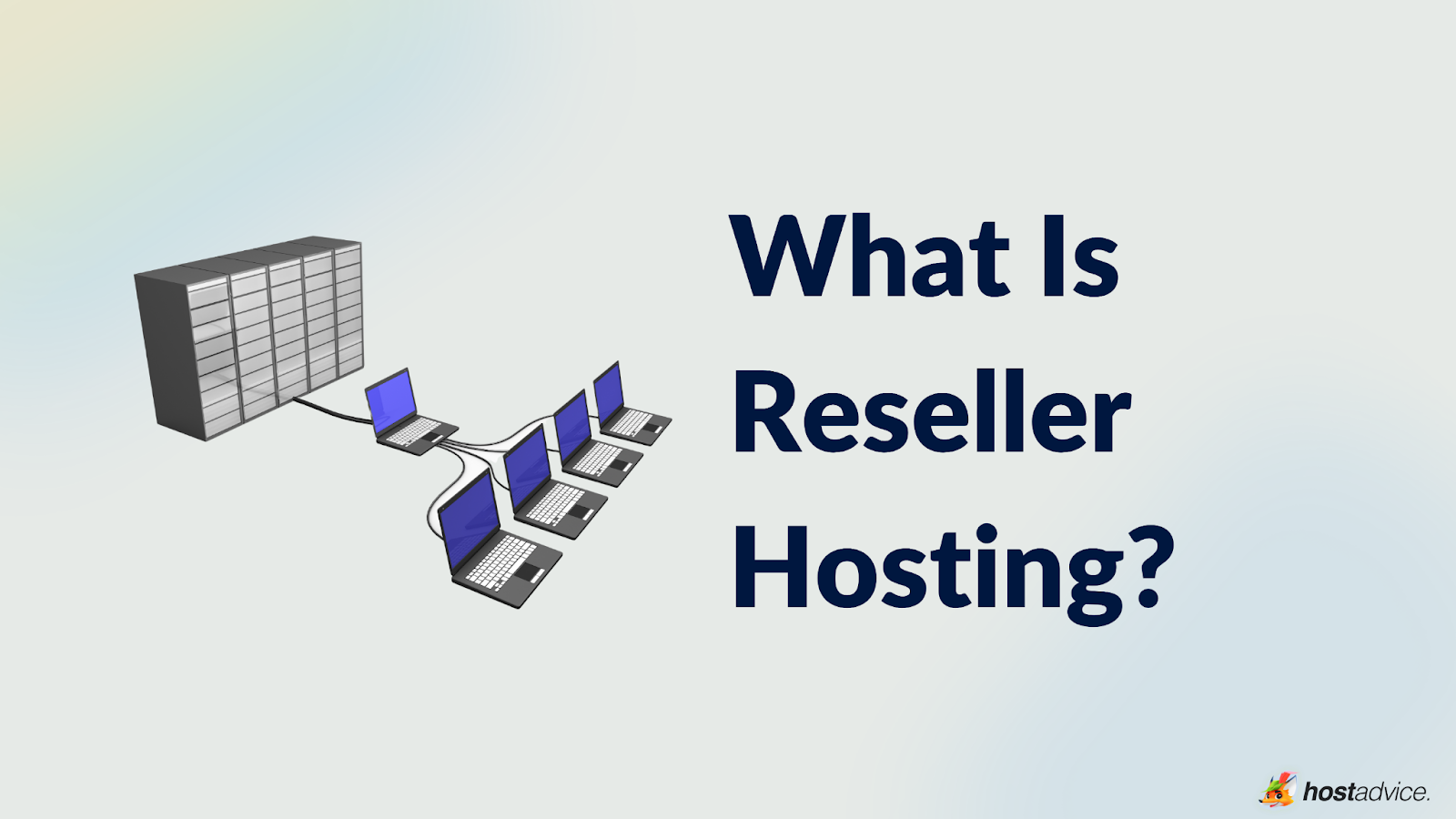
Reseller hosting is a model where individuals or businesses can offer web hosting services without directly managing the hosting infrastructure or needing technical expertise. A primary hosting provider supplies the services, and the reseller can brand and sell these services as their own.
Reseller hosting allows anyone, especially web developers and digital agencies, to easily become a web hosting provider, either as a standalone venture or a complementary service.
In this article, we will delve into the subject of reseller hosting, including the features to look out for, how it compares to other hosting types, and some of the best reseller hosting providers.
Ready for reseller hosting? Explore our top-rated Reseller Hosting Providers now!
- Reseller hosting is a service provided by a web hosting provider that lets you sell web hosting services on their own
- Reseller hosting is a great way to earn passive income if you already have a blog or are in the web development or web design niche.
- A reseller hosting business only requires little initial investment or technical knowledge.
- This business model requires fewer resources to start and has excellent long-term potential.
- Anyone can start a reseller-hosting website.
What is Reseller Hosting and Who is it For?
Reseller hosting is a hosting service that allows you to sell web hosting services to others. Think of it as buying a hosting service in bulk and selling to other people who need web hosting.
It is called “reseller†hosting since you only resell the hosting service. You do not own the underlying infrastructure or perform server maintenance or upgrades. The hosting company you bought the reseller hosting service from handles those. This hosting company is the parent hosting company.
For example, imagine four companies: A, B, C, and D.
- Company A is a web hosting provider that offers reseller hosting.
- Company B buys a reseller hosting package from company A and offers it to the general public.
- Company C and D purchase web hosting from Company B. In this sense, although Company C and D are paying fees to Company B, they are using Company A’s hosting services.
Who is Reseller Hosting for?
Starting a reseller hosting business offers a lot of incredible benefits whether you are doing it as a standalone business or integrating it as a complementary service.
While reseller hosting is available to everyone, it is ideal for those who plan to offer hosting services to others. It is perfect for web developers and designers who often manage web hosting for their clients. Online entrepreneurs can also set up reseller businesses to profit from hosting services.
For more info, check our detailed report on the most efficient ways to host websites for clients
How Does Reseller Hosting Work?
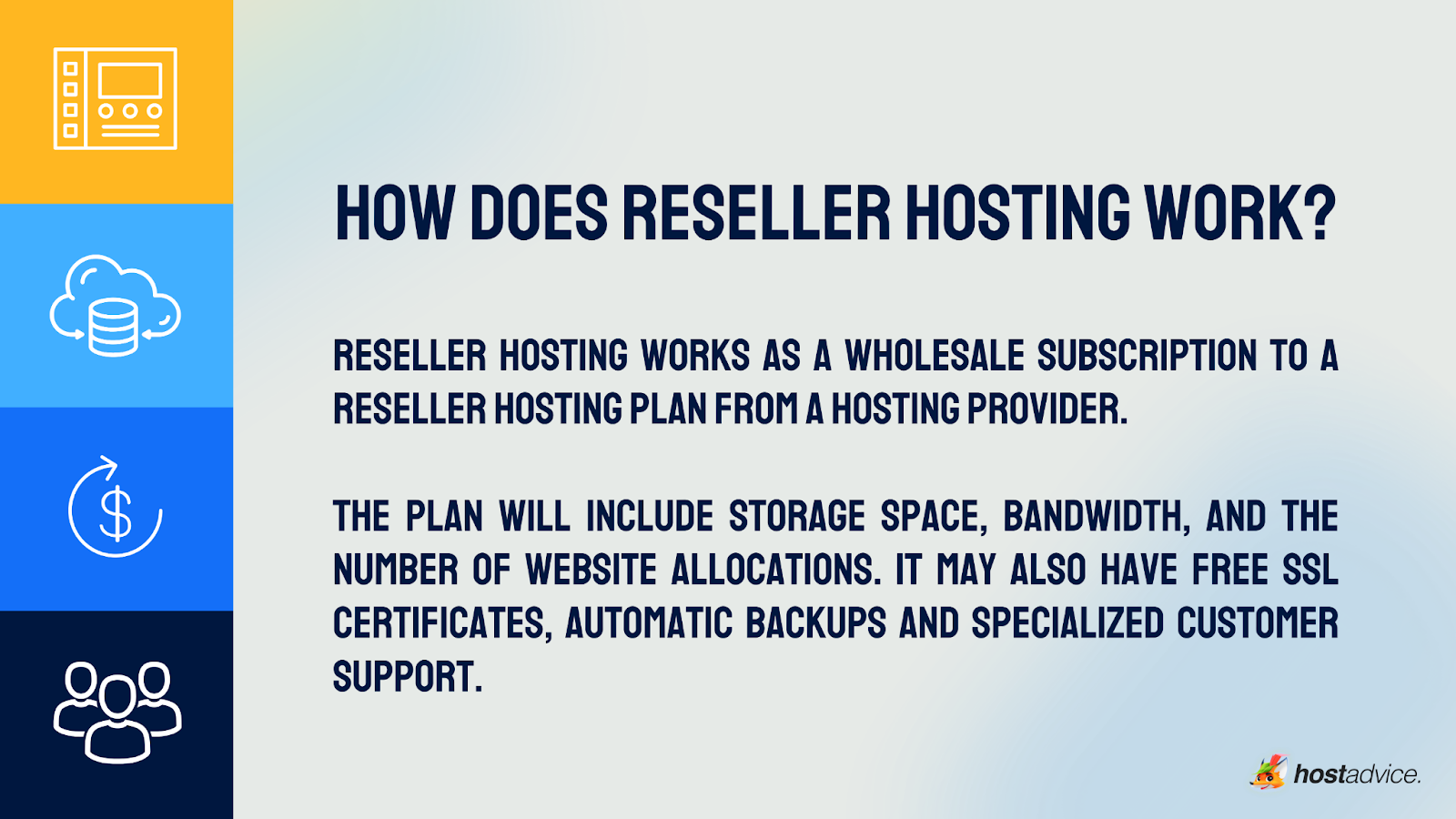
Reseller hosting works as a wholesale subscription to a reseller hosting plan from a hosting provider. The plan will include storage space, bandwidth, and the number of website allocations. It may also have free SSL certificates, automatic backups, and specialized customer support.
You are responsible for setting your prices and conditions, providing customer support, and managing your website. The parent hosting company provides and manages the underlying hosting infrastructure and may also provide technical support to you.
Some reseller hosting providers will charge a flat monthly fee based on your preferred package, while others will charge on a pay-as-you-go basis.
A typical reseller hosting package can allow up to 250 accounts. This means the reseller can sell hosting services to 250 people by buying just one Reseller hosting plan!
Setting up a Reseller Business
Here are the steps to starting a reseller business:
- Find a reputable hosting company
- Subscribe to a reseller package that meets your needs
- Create your own branded hosting packages
- Set your pricing and conditions
- Research and advertise to your target market
- Sell the hosting packages to your customers
After you have launched your reseller hosting company, you will need to market your business to attract new customers, especially in the early stages.
Read our guide on how to resell hosting and maximize your profit
Things to Look Out for in Reseller Hosting
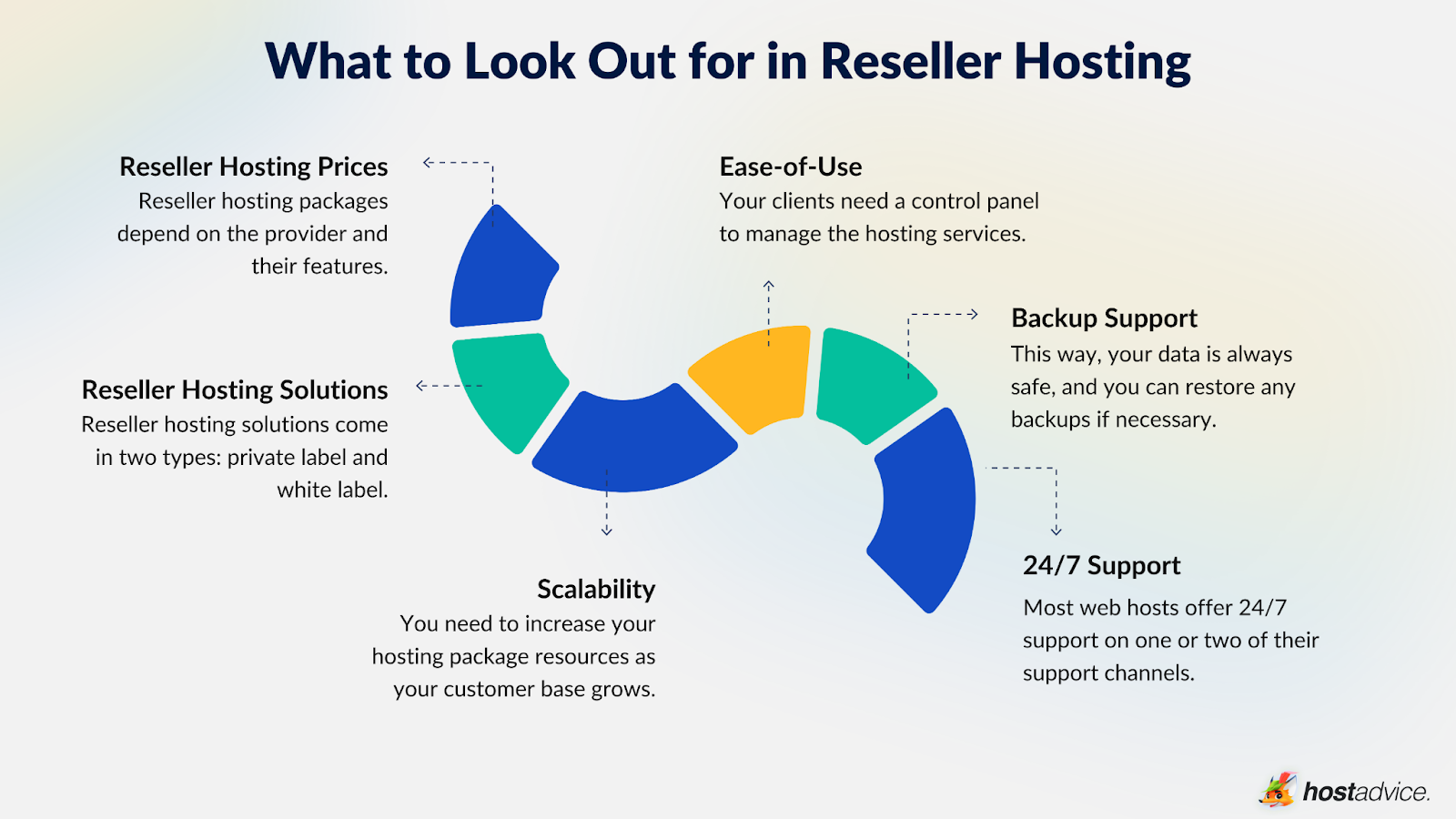
The reseller hosting market is filled with web hosts offering different levels of reseller hosting solutions. Review each provider, their service tiers and key features before choosing a reseller hosting service to start your business. Alternatively, you can check out the top reseller providers we’ve already reviewed
Below, you will find some of the most critical factors for consideration.
Reseller Hosting Prices
Reseller hosting packages come at different prices depending on the provider and the features contained within each plan. The average price range of a reseller hosting plan is between $7.49 to $150, depending on the tier and discount.
The key elements determining the price of a reseller hosting package are:
- Storage and bandwidth
- The number of supported websites
- Ram and CPU per cPanel account
- The number of cPanel accounts
- Web hosting type
- Dedicated IP
- Email accounts
The cost of Reseller Hosting isn’t merely about being high or low; it’s about the value it delivers. We’ve found that the most affordable reseller plans with the greatest value are Verpex, HostArmada and ChemiCloud.
Explore our Reseller Hosting Price Comparison
Reseller Hosting Solutions
Reseller hosting solutions come in two types: private label and white label.
Private label reselling means your customers will see the parent company’s branding. It will be evident that you are a reseller and not the owner of the hosting service.
White-label hosting allows you to sell the hosting service with your branding. It is ideal for businesses that do not want their clients to know that their hosting services come from a third-party company. It costs more than private-label reselling, but allows you to grow your brand.
Scalability
As your customer base grows you will need to increase your hosting package resources. If your chosen host does not allow easy scalability, you will have difficulty getting the resources necessary to accommodate increasing demand. This delay can repel new customers and hurt your business.
Alternatively, you can migrate to another reseller hosting company. However, the challenges of moving your business data and those of your clients from one web host to another can be costly in terms of time, money, and reputation. Choosing a reseller hosting company that offers scalable server resources from the onset is better.
Ease-of-Use
You and your clients need a control panel to manage the hosting services. There are many control panel options, but the two most popular are cPanel and Plesk.
cPanel Vs. Plesk: cPanel is exclusively for Linux hosting, while Plesk supports both Linux and Windows hosting environments. However, most hosting companies only offer cPanel. So if you expect Windows users among your clientele, look for a provider that provides Plesk.
WHMCS: Another vital tool to look out for is client billing management solutions. A good billing solution like WHMCS allows you to easily handle invoices and other billing processes.
Backup Support

Backup is essential as anything can happen to your website or your clients. An automated backup system is the industry standard since it automatically creates a backup of your website at specified intervals. This way, your data is always safe, and you can restore any backups if necessary.
Money-back Guarantee
Having a money-back guarantee will give you peace of mind. If you want to change your service provider, you can do so without losing your financial investment. However, you should know that the money-back guarantee is only valid for a specified period, usually 30 days. Don’t forget to read the terms and conditions to see if the money-back policy covers other paid services.
24/7 Support
Choose a web host that offers 24/7 customer support. Problems can occur anytime, and prompt access to technical support can determine whether the issue will break or make your business. Most web hosts offer 24/7 support on one or two of their support channels, such as 24/7 live and email support. We recommend you look for a provider that supports you and your clients.
The parent host will not respond directly to your customers. You will have to be the one to manually direct the issue to your parent host’s customer support team. This extended support will allow you to provide reliable and helpful customer support to your clients.
Benefits of Reseller Hosting
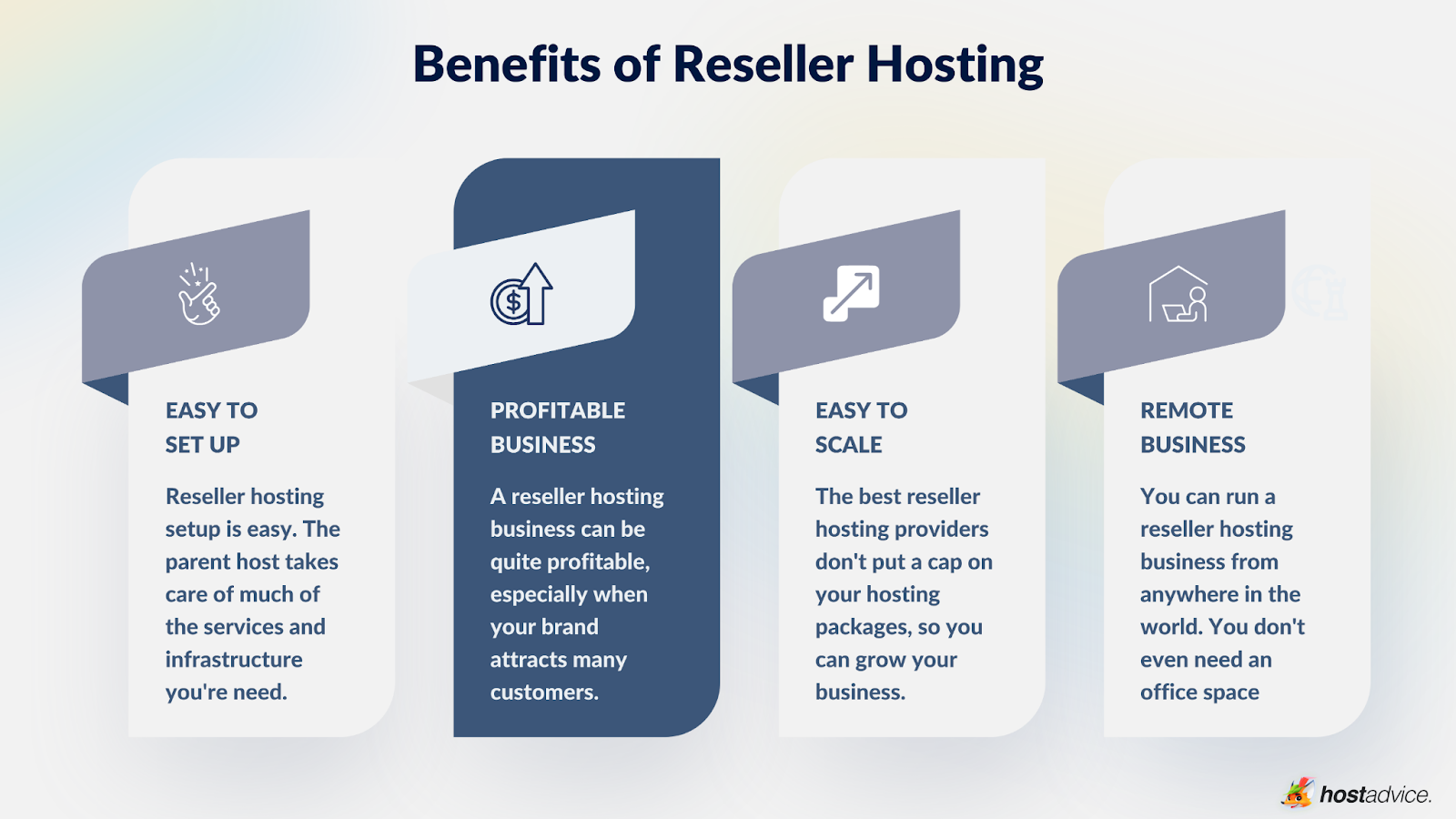
Here are some benefits of reseller hosting that make it an excellent business for web developers, designers, internet entrepreneurs, freelancers, and more.
Minimum Investment: Begin a reseller hosting business with modest funding. Reseller plans often start below $20. Additional essentials, such as web hosting and domain registration, may only set you back around $50 annually with our Cheap Reseller Hosting providers. While it’s worth investing in a quality website, logo, and marketing materials, free tools like e-commerce website builders and Canva make it cost-effective.
Easy To Set Up: Setting up a reseller hosting business is easy. All you need to do is create the website, sign up for a reseller hosting account, and the parent host will provide the underlying infrastructure and other tools you need.
Profitable Business: Is reseller hosting profitable? Yes it is, especially when your brand can attract many customers. A typical reseller package can cost about $20 per month. Imagine you create three tiers, with the middle tier selling for $3 per month. You will only need to sell seven of the intermediate packages to cover the cost of the account. Every other sale counts as a profit.
Remote Business: You can run a reseller hosting business from anywhere in the world. You don’t even need an office space. All that is required is your online presence and ability to respond to customer queries.
Scalable Business: The best reseller hosting providers don’t put a cap on your hosting packages. So you can continue to acquire new customers and grow your business. When your business gets big, you can upgrade your hosting plan or get a custom plan from your provider.
Passive Income Capabilities: You can run a reseller hosting business on autopilot. Both domain registration and Web hosting have auto-renewal options. You can also do the same for your reseller hosting package. The parent web host handles all technical issues on your behalf and some will even help you resolve customer issues. With automation like WHMCS, you can send invoices, set up cPanel for new customers, and much more without lifting a finger.
Here are some more benefits you will enjoy as a hosting solution reseller:
- You earn profit from the hosting website
- Start your hosting company without needing hosting infrastructure
- Offer hosting plans and packages based on the specific needs of your target audience
- Offer hosting solutions with your company branding
- Provide independent cPanel control panels for your clients
- Opportunity to scale your business or even start your independent hosting company
Recommended Reseller Hosting Providers
With the many options in the reseller hosting market, it is easy to pick a lousy provider. While you can always cancel your subscription, the time and effort you put into setting up the reseller hosting account would become a waste.
Our hosting experts have tested the popular reseller hosting providers and picked the Best Reseller Hosting Providers. Here are our top hosts, their pros, cons, and what makes them unique.
Verpex
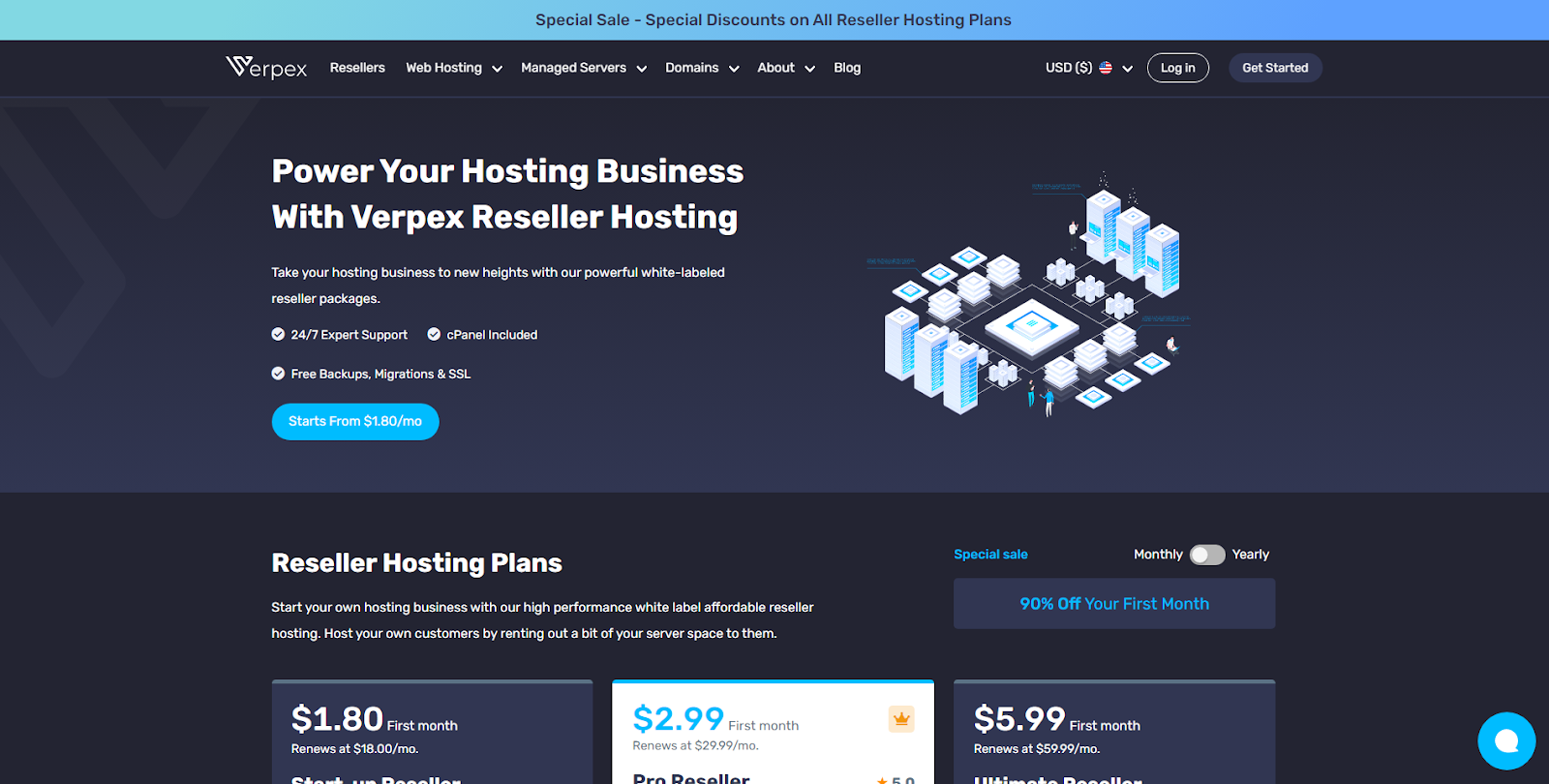
Verpex is our top recommendation for reseller hosting businesses. They offer a full white label service that allows you even to customize the cPanel you provide to your customers.
They also offer the lowest starting prices from a reputable reseller hosting company. The downside is that you’ll be paying a lot more on renewal. However, you get a 60-day money-back validity period to determine whether the service is worth the renewal price.
Pros & Cons
- 100% white label hosting (unbranded server names, custom name servers, and public cloud IP addresses)
- Superior reliability – 99.99% uptime and lightning-fast speed
- Incredible ease of setup and management (Anycast, WHM, WP CLI, SitePad Sitebuilder, cPanel with Softaculous, and more)
- The free domain is excluded from monthly billing cycles and excludes premium extensions (you can choose from many common TLDs or contact support if you have a specific requirement)
- Prices significantly increase on renewal – you get 90% off on your first month, which is not a recurring discount.
Special Features
- 100% white-label hosting
- Create custom nameservers using your domain free of charge (e.g.ns1/ns2.yourdomain.com)
- Customize the control panel for your customers to show your logo, color scheme, etc
HostArmada

HostArmada is one of our top recommendations for anyone starting their reseller hosting website.
HostArmada offers only Linux reseller plans. But unless you’re sure to get specific demands for Windows servers, it’s better to stick to Linux. The company also offers a 45-day money-back guarantee.
Pros & Cons
- WordPress- optimized environment (staging, WP-CLI, WordPress transfer, and themes/plugins updates)
- Unlimited control and easy management with cPanel and WHM
- Superior server performance, set of resources, and free extras (Speed Reaper features, dynamic caching, malware scan and removal, WAF & IP firewall)
- Renewal rates are triple the promotional prices (On the good side, you’ll benefit from transparent pricing with all rates shown on the website)
Special Features
- Cloud-powered hosting servers
- SSD-powered storage, the result is top-tier website performance
- Linux Reseller plans
Reseller Vs. Other Types of Hosting
There are different types of hosting services, and reseller hosting is one. In this section, we will see how reseller hosting compares to other types of hosting, such as dedicated hosting, VPS hosting, and shared hosting.
Reseller Hosting Vs. Dedicated Hosting – What’s the difference?
Dedicated hosting allocates the resources of a single physical server to one customer. The customer can use it to host multiple websites on the server or just one. Unlike reseller hosting, where you buy hosting resources and sell to other users.
A dedicated server costs more than reseller hosting, generally speaking. However, it has some advantages over reseller hosting. For instance, dedicated hosting is the clear winner regarding resource allocation, performance, security, scalability, control, and configuration. However, reseller hosting is the best choice for management, cost, and ease of use.
For a full breakdown, check out our in-depth comparison article on reseller hosting and dedicated hosting
Reseller Hosting Vs. VPS Hosting
With VPS hosting, the provider divides a single physical server into multiple virtual servers. Each virtual server stands alone and has a fixed allocation of resources. The provider sells each virtual server to a single client. The client can choose to host one or multiple websites on their servers.
The critical difference is that a provider designs a VPS hosting plan for a single user. In contrast, a reseller hosting plan is intended for a reseller hosting business to sell to other users.
VPS hosting offers many advantages over reseller hosting. These advantages include more resource allocation, full server customization, and better performance and security.
Learn more with our in-depth comparison between reseller hosting and VPS hosting
Reseller Hosting Vs. Shared Hosting – What’s the Difference?
Shared hosting is the most popular type of hosting, and it is also the cheapest. With shared hosting, multiple users/websites share a single physical server. All users have equal access to the server resources. The provider handles server management and upgrades.
Reseller hosting differs from shared hosting since it refers to buying wholesale web hosting and selling to other users for hosting their websites. Furthermore, shared hosting is mostly for small businesses and beginners, while reseller hosting focuses on those who want to offer web hosting services to other users. However, like shared hosting, the parent host handles server management and upgrades.
Read our in-depth comparison to learn the differences between reseller hosting and Shared hosting
Reseller Vs. Affiliate Programs
An affiliate program is for people who want to earn a commission for promoting a company’s products or services. The person who signs up for an affiliate program is called an affiliate marketer. For instance, you can sign up to be an affiliate marketer for HostArmada. You will earn a predetermined commission when someone subscribes to any of their services using your affiliate link.
Reseller hosting extends beyond just promoting another web hosting company’s services. You are essentially reselling them. This way, you have complete control over your “commission†since you can sell the services at any price you choose.
Read more to learn the key definitions and differences between reseller hosting and affiliate programs
How to Start a Web Hosting Business
There are two ways to build a web hosting business. You can either invest in your hosting infrastructure or leverage another hosting provider’s infrastructure. The latter option requires using a reseller hosting account on a parent host. This option is cheaper, easier, and can be turned into a passive source of income.
To start a web hosting business, you need to have the following:
- Business plan that outlines the type of services you want to offer and how you want to provide them
- Website that allows potential customers to find you and see your offerings,
- Reseller Hosting plan with a white-label feature so you can rebrand the hosting provider’s services with your brand and logo
- Billing and automation platform such as WHMCS to automate orders, billing, and payments, create web hosting packages and manage support tickets, and manage clients’ cPanel accounts.
Check our guide on How to make a reseller-hosting website
How to be a Successful Hosting Reseller
We’ve covered all you need to know about being a successful hosting reseller. Here are the top five areas to focus on:
- Reliable parent web hosting: Since you don’t have control over the servers, you need to ensure the parent host will do everything within its power to ensure quality performance.
- Find a niche: Providing niche services establishes your authority and helps you to stand out from the competition.
- Superior customer support: You can easily retain your existing customers and grow your client base with outstanding customer support.
- Marketing: You must market your reseller website in the early stages. To do this well, start by researching your target audience and how best to reach and convince them to subscribe to your hosting business. Some of the marketing strategies and tips to market your reseller business are:
- Starting a blog and, or a YouTube channel
- Leveraging email marketing
- Using customer reviews to build trust.
- Automation: This will help you save cost and time, thereby increasing your profit revenue.
Web Hosting Business Income
One of the best advantages of a web hosting business is there is no upper limit to how much you can make. This is because a web hosting business runs on the recurring revenue model. A recurring revenue model is a business model where customers pay for a product or access a service repeatedly rather than a single, one-time payment.
Depending on your setup and effort, your web hosting business income can go up to tens of thousands per year. The critical determinants for how much are the number of customers and your pricing. As long as you maintain your existing customer base and grow them, you will keep making more profit.
Getting clients can be challenging. But with our 11+ tips on how to get web hosting clients, your business can get up and running in no time.
Is Reseller Hosting Worth It?
Yes, starting a reseller hosting business is worth the investment. It is a promising endeavor for web designers, IT companies, web entrepreneurs, freelancers, marketers, and marketing agencies. You can use it as a standard business or integrate it into your current business while earning a nice profit.
The underlying model is simple and very lucrative. You purchase wholesale hosting services from a hosting provider and resell them in smaller packages to your clients at a markup.
People who are great with online marketing, have an existing audience interested in web hosting, or work with websites, such as website designers, marketers, IT companies, and freelancers, can profit from it.
Check our in-depth article to learn whether starting a reseller hosting business is worth the investment.
Conclusion: Start Your Reseller Hosting Business
Reseller hosting is a lucrative online venture where you buy wholesale hosting packages and resell them in small units to your customers. You can augment them with premium features to increase their appeal and boost your profits. Overall, it is a great venture to earn revenue without high financial commitments.
To get started, you want to read our detailed guide on how to make a reseller hosting website.
When you’re ready, partner with HostArmada, Verpex , or ChemiCloud for secure, customizable, all-inclusive reseller packages for agencies and growing businesses.
Next Steps
- Get the best reseller hosting provider for your website
- Find affordable reseller hosting providers
- Learn how to become a hosting reseller
- Discover the best ways to get web hosting clients









